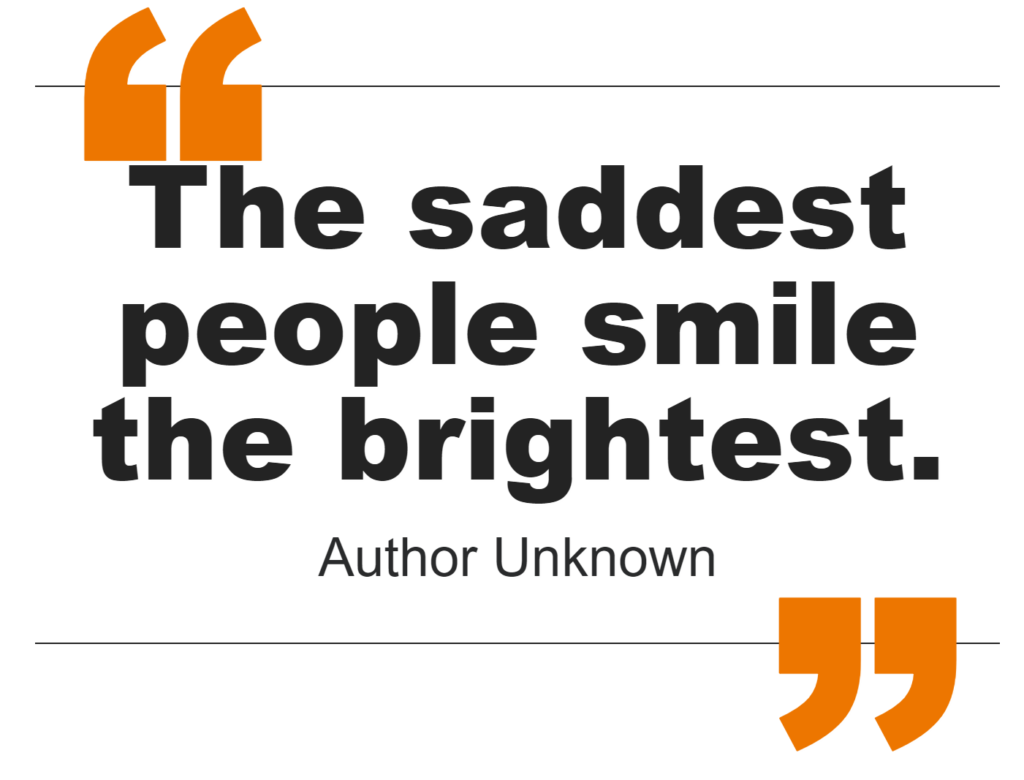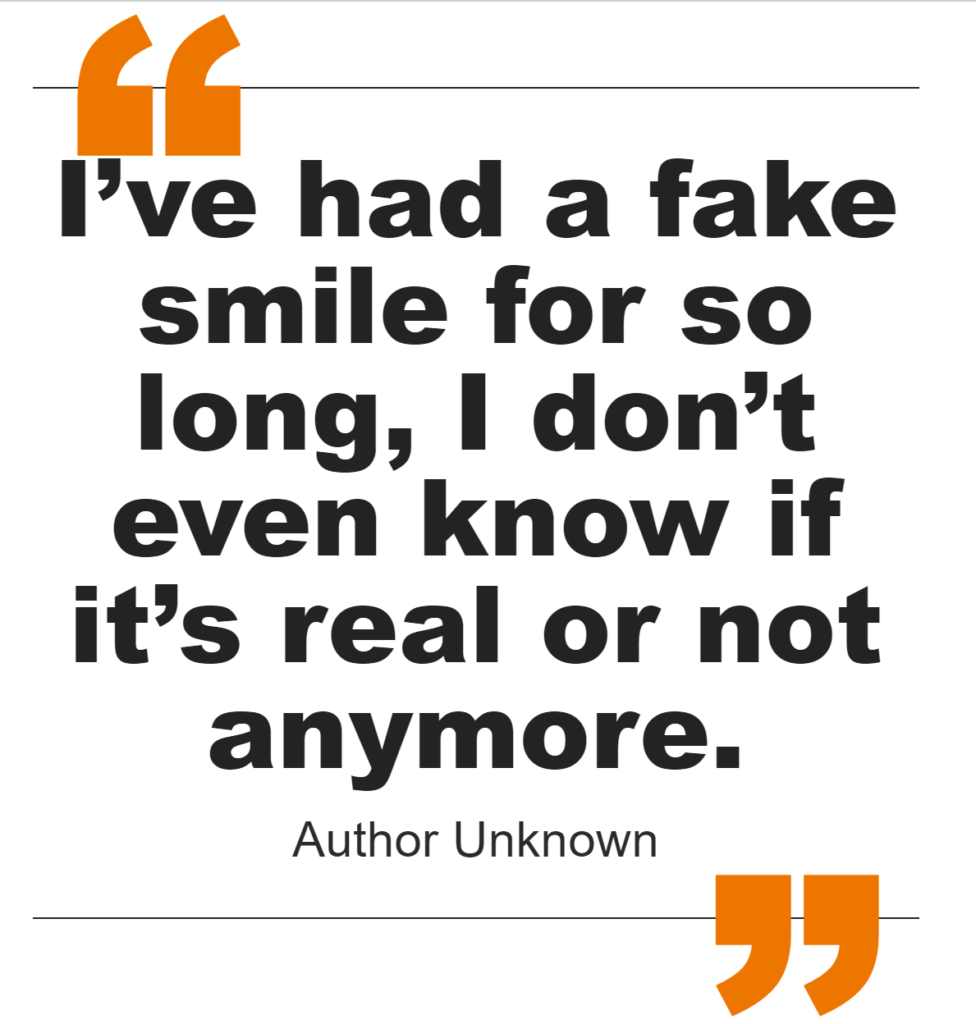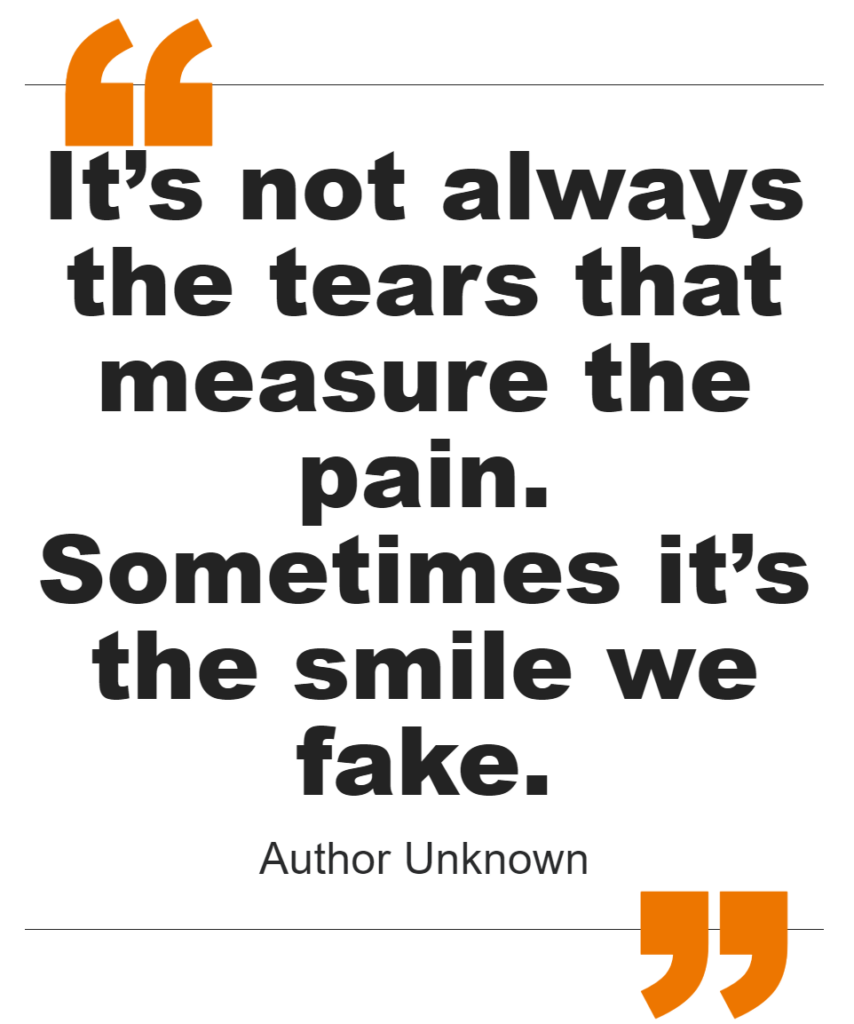Today, many Nigerians are suffering from smiling depression, which is a type of depression in which a person looks happy on the outside, but is actually experiencing pain within. Smiling depression is a term experts in mental health use to describe when a person masks their depression behind a smile. Someone with smiling depression looks happy on the outside when, in reality, they may be struggling with feelings of internal hopelessness and sadness.

Smiling depression is what’s known as an oxymoron—two words that don’t seem to make sense together. Unfortunately, smiling depression is real. It’s a form of depression in which a person appears to be happy and even thriving on the outside while suffering on the inside. A person with smiling depression may get good grades, do lots of extracurricular activities, and have a large circle of friends, all while hiding their true feelings from those who are closest to them.
Smiling depression is especially dangerous because it’s more difficult to detect than other types of depression, so people don’t get the support and treatment they need. In addition, people with smiling depression may be at higher risk of suicide. Because they’re accustomed to powering through the pain, they may have more energy and focus to make a suicide plan and follow through with the attempt.
What Is Smiling Depression?
Also known as walking depression or high-functioning depression, smiling depression has become a commonly used term over the last few years. However, it is not a recognized diagnosis and thus does not appear in the American Psychiatric Association’s Diagnostic and Statistical Manual of Mental Disorders.
Experts believe that smiling depression may actually be a condition known as major depressive disorder with atypical symptoms, formerly known as atypical depression. While the symptoms are essentially the same as those of major depression, what makes them “atypical” is that they are experienced internally and not expressed in any visible way. Another confusing element of major depressive disorder with atypical symptoms is that individuals with this diagnosis can experience a lift in mood in response to positive events, enhancing the façade that they are “doing fine.”
While there are no smiling depression statistics as such, researchers estimate that between 15 and 40 percent of people with depression experience atypical symptoms. Smiling depression can also resemble the manic phase of bipolar disorder, or what’s called “bipolar disorder with mixed features.” With this condition, depressive symptoms manifest as manic behavior and increased energy.
Smiling Depression and Suicide Risk
The biggest danger of smiling depression is that it will go unnoticed and therefore untreated. Because smiling depression doesn’t fit the stereotypes most people have about depression, family members and close friends often fail to notice what’s going on. People can seem cheerful, optimistic, successful, and high-energy even while living with depression that may be quite severe.
Sometimes even people themselves may not realize they are depressed. For example, one study found that people from cultures that are less focused on individual emotional states were more likely to experience the physical symptoms of depression—such as fatigue, headaches, stomachaches, and lack of appetite—rather than the emotional ones. Therefore, they don’t recognize what’s happening to them.
Furthermore, while people coping with depression often feel alone, smiling depression can leave people even more isolated, because no one around them sees what they’re really going through. Without treatment, people with this type of depression may have a higher likelihood of self-harm and death by suicide.

A Sad Person Acting Happy: How People With Smiling Depression Really Feel
While putting on a happy face for the world, people with this disorder usually feel very different inside. They are exhausted by the effort of hiding their depression day in and day out, and constantly afraid of being discovered. In addition, they may experience any or all of the following depression symptoms:
- Overwhelming sadness and hopelessness
- Lack of self-confidence and self-worth
- Anxiety
- Mood swings
- Difficulty concentrating and making decisions
- Suicidal thoughts
- Not taking pleasure from activities they used to enjoy, despite pretending to.
People with smiling depression become extremely good at hiding their symptoms. Therefore, parents may be more likely to identify some of the physical and behavioral signs as indicators of a problem:
- Sleeping too much or too little, including long naps during the day
- Significant changes in appetite or weight
- A feeling of heaviness in the arms and legs
- Headaches or body aches
- Irritability and restlessness
- Substance abuse
- Extreme reactions to what they see as criticism or rejection.
Why People Hide Behind a Smile
People with smiling depression often have a strong support system and resources, yet they are unable to open up about their struggles. This is particularly true if they belong to a culture that tends to stigmatize mental health issues, or are part of a family that puts high value on using willpower and self-reliance to get through hard times rather than talking about it or asking for help. In these cases, people may feel that struggling emotionally is a sign of weakness or a lack of personal character. This is particularly true of male adolescents, who are conditioned to be less open about their feelings.
In general, if a person has shared what they’re feeling in the past and been told to “snap out of it” or “try harder,” it will be even harder for them to bring it up again. In addition, people who are more likely to have smiling depression are often perfectionists, afraid of failure, and more easily embarrassed and humiliated. They have high expectations of themselves and don’t want to disappoint others’ expectations, or change the image that others have of them as a successful, positive person. They believe they just need to be “stronger” and “better” in order to get through it.
Moreover, if the family is dealing with financial issues, or another family member has physical or mental health problems, a person may hide their depression because they’re worried about being an additional burden. (That may be one reason for a possible increase in smiling depression, along with other mental health issues, during the pandemic.) On the other hand, a depressed person may feel guilty about suffering and “complaining” when their life is “fine” and other people “have it so much worse.” Or they may be in denial about the fact that they are living with depression.
Social Media and Smiling Depression
Social media, where people are always “smiling”—showing images of their best, happiest selves—tends to create a disturbing dissonance between what someone is really feeling and the face they show to the world. Looking at other people’s carefully curated self-images can give people the feeling that they have to appear just as positive and smiley in order to gain approval. And that idea can then translate to real life, opening the door to smiling depression and other psychological issues.
To interrogate the images of perfection that are so common on social media, Women’s Health and the National Alliance on Mental Illness did a reality check. They surveyed women about what they were really feeling when they posted a happy selfie. About 20 percent of the women who responded admitted that they had shared photos and captions that depicted the opposite of their real feelings at that moment, because they didn’t feel safe sharing about their anxiety or depression.
On the flip side, there’s also a social media phenomenon known as “sadfishing”—displaying one’s emotional pain in social media posts in order to garner attention and sympathy. Sadfishing posts aren’t always authentic, anymore than smiling ones are, but they serve as much more obvious warning signs that a person may be suffering.
Recognizing Smiling Depression
Since signs of this type of depression are so subtle, it’s important for parents to maintain close communication and connection with people even when they appear to be doing well. When parents encourage open conversation and listen to people rather than judging them, their kids feel more comfortable being honest about their emotions. Moreover, people need to hear that their parents won’t be disappointed in them if they aren’t “perfect,” and that having the courage to ask for help is a strength, not a flaw.
4 Things Only People With Smiling Depression Will Understand
If you picture a depressed person as someone who can’t stop crying, who is exhausted, who doesn’t want to socialize, or who has stopped taking care of their health or appearance, you may be right. However, depression can also look like an A student, a social butterfly, or a consummate professional. The most pulled-together, on-top-of-everything, energetic gregarious person you know could be suffering from depression.
How is it possible that someone could be depressed without showing any symptoms? This is what is called “smiling depression.”
You could also think of it as high-functioning depression. People who have smiling depression do experience symptoms, but they mask or internalize the symptoms so that they’re not obvious to others. Take a look at some statements that people who have smiling depression will understand.
“A fake smile may fool the crowd but it never eases the pain.” – Kelly Brook
1. “I Don’t Want to Upset Anyone Else”
People with smiling depression may feel responsible for other people’s feelings as well as their own. For example, a teen with smiling depression may not want their parents to feel worried or their friends to feel burdened or bored by their problems. Keeping up the smiling façade doesn’t do anything to alleviate the depression, but it does seem to keep others around them happy.
Very often, people with smiling depression are also people who are perfectionists, people who take on heavy responsibilities, and people who are held to high standards, either by themselves or by someone else. They may fear disappointing others, failing to live up to their own standards, or being seen as weak, disappointing, or unreliable. These fears cause them to hide the signs of depression that other people are likely to recognize. However, they still experience distressing symptoms like anxiety, loss of appetite, sadness, fatigue, fear, insomnia, or intrusive thoughts. They just don’t show or talk about them.
2. “I Want to Feel as Happy as I Look”
Smiling depression could be an attempt at a “fake it till you make it” approach to depression. That is, the person may believe that by smiling, laughing, and going about their day-to-day life as if everything were OK, they can eventually force themselves to feel OK.

“Fake it till you make it” can be an effective strategy in certain situations. In therapy, this is sometimes referred to as acting “as if”. For example, if you want to be more confident, you can act as if you were more confident by doing what a confident person would do in a given situation – say, introducing yourself to a stranger at a party or boldly talking up your accomplishments and skills in a job interview. And in those scenarios, acting as if often works. Acting as if you’re happy when you’re feeling a little down or having a bad day can also work – smile enough and you may eventually boost your own mood.
However, there are also times when acting as if, or faking it, doesn’t work at all. For pervasive, long-lasting depression, it takes more than just acting happy to actually bring on feelings of happiness. Faking it also tends not to work when the person is doing it more for other people than for themselves. Acting happy just to please the people around you or make them more comfortable can actually be quite isolating, and that feeling of isolation may make depression worse, not better.
3. “I Don’t Know If My Smiling Depression Is Real”
Smiling depression could be a deliberate attempt by the depressed person to hide their true feelings, but it can also be unintentional. Sometimes, people with smiling depression don’t know why they keep smiling, and they may not trust their own feelings. They may not even recognize that they are depressed.
Because someone with smiling depression often seems well-adjusted, happy, and content, they also often receive complimentary feedback on these characteristics. Being told that they’re “so cheery!” or “so successful!” or “so motivated!” when they don’t feel cheerful, successful, or motivated can be confusing. They may view themselves as negative, worthless, or lazy for not feeling like they live up to the appearance they’re presenting to others instead of realizing that it’s depression that’s responsible for the disconnect between the way they appear and the way they feel. This can lead to doubling down on keeping up appearances rather than reaching out for help.

4. “I Want to Tell People How I Feel, but I Can’t”
Hiding or masking a serious problem like depression is like building an invisible wall between the depressed person and the people around them. The longer it goes on, the higher and more impenetrable the wall becomes. A person with smiling depression may recognize that they need support, but feel unable to get the words out when they have the chance to.
A person who has smiling depression may feel like they will have to explain their outwardly happy behavior if they confess to feeling depressed, and they may not feel up to the task – or necessarily even understand it themselves well enough to explain it. The longer they go on presenting a smiling face to the world while inwardly suffering from depression, the harder it may feel to explain.
If a person with smiling depression does attempt to speak out about it and is met with skepticism and unhelpful comments like, “you don’t seem depressed,” they may withdraw even further, feeling that they won’t be believed or understood. They might doubt their own feelings. They may feel unable to press the issue further or seek out someone else to talk to.

Treating Smiling Depression
As with other types of person depression, atypical depression requires a full assessment and professional care provided by clinicians who specialize in treating this age group. Ultimately, effective treatment for smiling depression involves helping a client to acknowledge what they’re experiencing and guiding them to process underlying trauma and attachment wounds. As they build self-compassion and resilience, people come to realize that it’s okay to stop hiding and step into their true, authentic selves.
Learn How to Recognize the Signs of Smiling Depression
Smiling depression is deceptive. While people with smiling depression may look like they’re going through their lives successfully, they’re still experiencing all of the negative effects of depression. Smiling depression can lead to other health problems, it can lead to self-harming behaviors, and it can also lead to suicide. Compared to other forms of depression, which tend to leave sufferers without much energy, smiling depression may put sufferers at greater risk of suicide because they’re less likely to receive help and support and because they have the energy to act on suicidal thoughts. Recognizing subtle signs of smiling depression can help ensure that the person with depression gets the help they need.
https://paradigmtreatment.com/people-smiling-depression/
www.newportacademy.com/
Support Us To Do Better
Dear Reader,
Every day, we work hard to provide our audience with the most comprehensive information that could help to improve a positive and healthy lifestyle. Quality blogging costs money. Today, we’re asking that you support us in doing more. Your support means that Positive Psychology can keep offering quality service to everyone. Pay as little as N1,000 to support us.
Bank transfers can be made to:
Zenith Bank
2250531253
Adebayo Oluwole
Please send details of your bank transfer to our email or WhatsApp number so we can contact you.
If you have any questions, please let us know.
Contact us at Positive Psychology and Educational Consult. At Positive Psychology and Educational Consult, we are ready to help you to navigate your life. Contact us today. Phone: +2348034105253. Email: positivepsychologyorgng@gmail.com twitter: @positiv92592869. facebook: positive.psych.1
